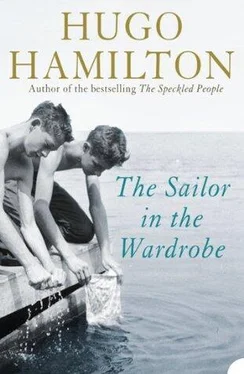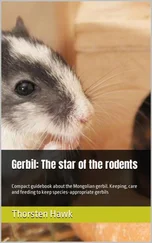‘Buffaloes,’ is all I could make out. ‘Papist buffaloes.’
It was a Northern curse, one that you hear on the radio these days. I tried to imagine what would happen if these two men met face to face, what they would do to each other. This time, Dan stared back as if this was some kind of drunken madman who lived out on the island and the less notice you took of him the better. I could see the thimble shape of the Martello tower and the rough grass draped over the island like green tweed. The seagulls were waiting quietly for something to happen. There was a cormorant on a rock spreading his black, oily wings out to dry. I wondered where the island goats had gone to and where they could possibly hide in such an exposed place. I could see the black tide mark all around the edge of the island and I began to imagine that there was also a black rim on the man’s lips, from drinking and shouting.
I could see him staggering as he tried to come closer, stepping forward on the rocks as if he was going to walk across the water and kill Dan with his own hands. He began to gesture at us, holding the bottle down to his groin. And still Dan carried on without a word, steering past without seeing him and without hearing him over the sound of the engine. The boat bounced across the waves, cutting through the water and separating the white wash to each side. Dan looked back as if he could stare the man off the island, out of existence. He was standing there, balancing on the rock with the bottle in his hand, shouting but unable to reach us with his anger. He took aim and the bottle crashed on the edge of the island, making a tiny noise like a coin or a brass button falling to the ground.
We kept going towards the harbour and steered right into a cloud. It started raining heavily and my knees were getting wet. Behind us, the island was still in sunshine and the grass was lit up luminous green against the dark blue clouds. We knew the rain would hit the island soon and then we would all be soaked. We kept going with the rain bouncing on the water and Dan looking back at the island until it disappeared from view.
The first thing we noticed about Stefan was that he didn’t eat cake. Nobody had ever refused my mother’s baking. Maybe he had better things on his mind and didn’t come over to Ireland to eat cake, but it was still hard to think of anyone in his right mind being able to take their eyes off the coffee cake that was specially made for his arrival. It was decorated into sections on top with little squiggled walls of coffee cream which my mother pressed out with her stainless steel syringe, like triangular fields with a haystack in each. She made this cake only on special occasions, when we had a guest, or when there was a birthday to celebrate, so it was like a big prize, standing on the side table with everybody glancing over now and again to make sure it hadn’t suddenly disappeared.
We watched Stefan as if we were living at the end of the world and he was the first visitor from outside for a million years. We were like a family cut off by long distance, living on an island so far away that it took him years to reach us. We watched the way he chewed. The way he smiled. Every word he uttered. He spoke German like us, but it was so unusual to see anyone apart from ourselves sitting at the table that we all felt we had been left behind in time. Stefan took the place of Franz at the table, so everybody had to move down one chair to make room, as if he was an older brother who had been missing and had finally come back to us for good. Maria was wearing the new dress that she had made with a pattern of sparks and stars in various colours and my sisters all laughed until they had tears in their eyes whenever Stefan made the slightest joke. Ciarán was examining Stefan’s bony cheeks and my mother was asking lots of questions, saying Stefan was tall like his father, Ulrich, but that he had the eyes and the smile of his mother, Käthe. Stefan explained that he was studying medicine, but that he was taking some time off to look around Ireland before it was too late.
When it came to the big moment when my mother cut the cake and placed the first slice on the plate with the silver cake trowel, making sure it didn’t fall over on its side, Stefan shook his head and passed the plate back.
‘No thanks,’ he said with a smile. ‘Not for me.’
‘No cake,’ my mother said, and she was obviously surprised.
She didn’t ask him a second time or try to force him the way she would if she was Irish. She offered him Florentines and biscuits instead, but he shook his head at those too. She continued handing out slices of cake to each of us and we stared at the plate in front of us, as if we were doing something strange in our house, something ancient that other people had given up years ago, like being German or speaking the Irish language. I lost interest in the cake myself and my mother thought there was something terrible happening, because I was the one who would always ask for a second slice and now I couldn’t even finish the first.
After the table was cleared, my father spread out a map and started pointing at all the important places in Ireland, giving Stefan information on Irish history, showing him pictures of Robert Emmet on Thomas Street and pictures of the GPO in flames, saying that he would bring him in the car to show him some of these sights. Stefan was listening eagerly and I could see how excited my mother and father were, talking about Ireland. She spoke about the time she first arrived and went cycling on her own up to Lough Derg. My father spoke about Connemara and other places that had to be seen to be believed. It almost looked like they were talking to each other more than to Stefan, trying to convince themselves that these beautiful places still existed, not just in their memory. They took out old photographs and postcards, urging Stefan to travel around as fast as he could before they disappeared.
All the time, while they were talking about Ireland, they were postponing the moment when they would have to discuss the ancient German book, the treasured gift from the time of Gutenberg which Stefan had come to claim back. My mother continued to smile and speak to him in a friendly way to make sure that he felt welcome, but I could see that she was worried underneath and maybe also a little angry or disappointed, too, that nobody remembered what she did for them. In the kitchen afterwards, while my father brought Stefan up to the front room to show him more books about Irish legends, my mother stood staring at the left-over cake as if there was something wrong with it.
‘It wasn’t always like that in Germany,’ she said.
When the war was over, my mother travelled down to Mainz on the train to try and get a job with the Americans. She had to fill in a form called the ‘Fragebogen like everyone else, to state what organizations she had belonged to and what she had been up to during the war. She had never joined the Nazi party. She had been drafted into the Wehrmacht, but she didn’t like to say that she was arrested as a deserter during the last winter of the war, because she thought that might reflect badly on her character.
Her records were in order, so she managed to get work with an American officer and his family in Wiesbaden. Everyone thought she was so lucky, living in a beautiful house on the hill, looking after three small American children, with lots of food at a time when everybody in Germany had nothing. My mother wanted to share this luck and started sneaking food out of the house every evening. When the children were asleep and she had some time off, she got a train to Rüsselsheim to her sister Elfriede and her family. My mother says the two boys, Bernd and Rheinhold, had grey teeth when she first went to see them, and her husband Adam was so thin after being released from captivity that every time he ate even the smallest thing he felt ill again and had to lie down. Rüsselsheim is famous for the big Opel factory where Onkel Adam now works. It’s also famous because when the Americans bombed the town during the war the people were so angry that a big crowd of them gathered in the street one day to kill some American pilots who had been captured nearby. After the war, everybody changed and became grateful to the Americans for rescuing them. The Americans went from bombing cities with explosives to bombing cities with raisins, they said. The city of Mainz was heavily destroyed, and my mother remembers seeing the people in the ruins, picking out the bricks and stacking them up to be re-used. She remembers people in the fields going on potato hunts to see if they could find anything that the farmers had missed. She said there was a time of famine in Germany.
Читать дальше
Конец ознакомительного отрывка
Купить книгу












